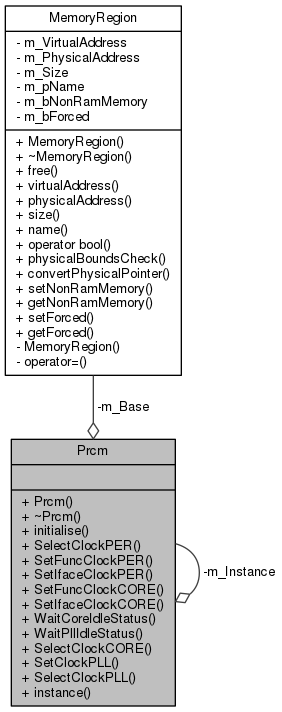#include <Prcm.h>
 Collaboration diagram for Prcm:
Collaboration diagram for Prcm:Public Member Functions | |
| void | initialise (uintptr_t base) |
| void | SelectClockPER (size_t clock, Clock which) |
| void | SetFuncClockPER (size_t clock, bool enabled) |
| void | SetIfaceClockPER (size_t clock, bool enabled) |
| void | SetFuncClockCORE (size_t n, size_t clock, bool enabled) |
| void | SetIfaceClockCORE (size_t n, size_t clock, bool enabled) |
| void | WaitCoreIdleStatus (size_t n, size_t clock, bool waitForOn) |
| void | WaitPllIdleStatus (size_t n, size_t clock, bool waitForOn) |
| void | SelectClockCORE (size_t clock, Clock which) |
| void | SetClockPLL (size_t n, size_t value) |
| void | SelectClockPLL (size_t n, size_t value) |
Static Public Member Functions | |
| static Prcm & | instance () |
Private Attributes | |
| MemoryRegion | m_Base |
Static Private Attributes | |
| static Prcm | m_Instance |
Detailed Description
PRCM - Power, Reset and Clock Management - abstraction
- Todo:
Power management
Reset
Member Function Documentation
| void Prcm::initialise | ( | uintptr_t | base | ) |
Initialises the PRCM from a specific base
- Todo:
- Proper initialisation
Definition at line 36 of file Prcm.cc.
References PhysicalMemoryManager::continuous, PhysicalMemoryManager::instance(), VirtualAddressSpace::KernelMode, and VirtualAddressSpace::Write.
Referenced by ArmBeagle::initialise2().
 Here is the caller graph for this function:
Here is the caller graph for this function:| void Prcm::SelectClockCORE | ( | size_t | clock, |
| Clock | which | ||
| ) |
Handle source clock selection for CORE
Definition at line 78 of file Prcm.cc.
References ERROR.
Referenced by UsbUlpi::initialise().
 Here is the caller graph for this function:
Here is the caller graph for this function:| void Prcm::SelectClockPER | ( | size_t | clock, |
| Clock | which | ||
| ) |
Handle source clock selection for PER
Definition at line 50 of file Prcm.cc.
References ERROR.
Referenced by GPTimer::initialise().
 Here is the caller graph for this function:
Here is the caller graph for this function:| void Prcm::SelectClockPLL | ( | size_t | n, |
| size_t | value | ||
| ) |
Clock selection for PLL. The register contents must be set by the programmer.
Definition at line 308 of file Prcm.cc.
References ERROR.
Referenced by UsbUlpi::initialise().
 Here is the caller graph for this function:
Here is the caller graph for this function:| void Prcm::SetClockPLL | ( | size_t | n, |
| size_t | value | ||
| ) |
Enables or disables a PLL clock (programmer chooses value)
Definition at line 335 of file Prcm.cc.
References ERROR, and WARNING.
Referenced by UsbUlpi::initialise().
 Here is the caller graph for this function:
Here is the caller graph for this function:| void Prcm::SetFuncClockCORE | ( | size_t | n, |
| size_t | clock, | ||
| bool | enabled | ||
| ) |
Handle functional clock enable/disable for CORE
Definition at line 166 of file Prcm.cc.
References ERROR, and WARNING.
Referenced by UsbUlpi::initialise().
 Here is the caller graph for this function:
Here is the caller graph for this function:| void Prcm::SetFuncClockPER | ( | size_t | clock, |
| bool | enabled | ||
| ) |
Handle functional clock enable/disable for PER
Definition at line 110 of file Prcm.cc.
References ERROR.
Referenced by GPTimer::initialise().
 Here is the caller graph for this function:
Here is the caller graph for this function:| void Prcm::SetIfaceClockCORE | ( | size_t | n, |
| size_t | clock, | ||
| bool | enabled | ||
| ) |
Handle interface clock enable/disable for CORE
Definition at line 200 of file Prcm.cc.
References ERROR, and WARNING.
Referenced by UsbUlpi::initialise().
 Here is the caller graph for this function:
Here is the caller graph for this function:| void Prcm::SetIfaceClockPER | ( | size_t | clock, |
| bool | enabled | ||
| ) |
Handle interface clock enable/disable for PER
Definition at line 138 of file Prcm.cc.
References ERROR.
Referenced by GPTimer::initialise().
 Here is the caller graph for this function:
Here is the caller graph for this function:| void Prcm::WaitCoreIdleStatus | ( | size_t | n, |
| size_t | clock, | ||
| bool | waitForOn | ||
| ) |
| void Prcm::WaitPllIdleStatus | ( | size_t | n, |
| size_t | clock, | ||
| bool | waitForOn | ||
| ) |
The documentation for this class was generated from the following files:












 1.8.11
1.8.11